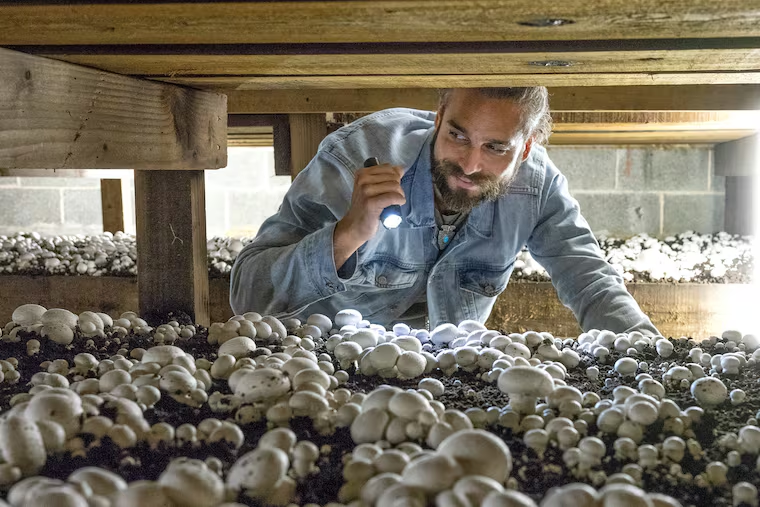Why the U.S. mushroom business is migrating to Canada
Growers lack pickers, and the private-equity backers of one of the biggest suppliers in the Pa.-based industry is buying export-oriented plants up North.

One of the largest U.S. mushroom growers, based in southern Chester County, plans a major expansion — in Canada, which has been growing more mushrooms and exporting to grocers in the U.S., where production has declined in recent years.
Kennett Square-based South Mill Champs, a major supplier to both East Coast and West Coast markets, has agreed to buy Canada’s family-owned Loveday Mushroom Farms to fill in its market map and supply metro areas in the U.S. Midwest, along with Loveday’s customers in central Canada.
South Mill Champs said last year it planned a new, 500-worker mushroom farm in mostly rural Elk Township, Chester County, after winning a $1.5 million state grant to extend natural gas service to the property.
But that plan remains on the drawing board, as the company and its private-equity owners buy the Loveday facilities, before taking the risks of building more of their own.
The deal will boost company production by 10 million pounds a year, to more than 100 million pounds, or about 9 percent of the entire combined U.S. and Canada crop. South Mill Champs won’t say what it paid.
South Mill Champs, which also owns the Champs mushroom farms and mushroom snack operations in British Columbia on Canada’s Pacific coast, is responding to growing demand, chief executive Lewis Macleod said.
With demand up and domestic U.S. production down 11 percent, to 827 million pounds, from 2017 to 2019, mushroom prices rose 6 percent in 2017-18 and 3 percent in 2018-19, faster than the general inflation rate, according to U.S Department of Agriculture data.
West Coast U.S. grocers, in particular, were having a tough time finding enough mushrooms to meet demand earlier this year, according to the U.S. Foods Farmer’s Report issued March 20.
U.S. growers blame a shortage of workers willing to face the industry’s seasonal variations, piece rates, and rapid pace. Growers have also been reluctant to adopt Dutch mushroom automation technology, given the high expense.
In Chester County and at nearby farms in Berks County, Delaware and Maryland, jobs have been filled since the 1970s by Mexican immigrant labor.
Several thousand mushroom-picking and -packing workers obtained legal residency after the Reagan amnesty in 1986. Mexicans and other Latinos now comprise half the population of Kennett Square borough, and farmworker family members have gone on to establish restaurants, stores, churches, and construction and service businesses. But new farm labor visas have been scarce, compared with demand.
“Labor shortage can explain the decreases in [U.S.] production,” said Lori Harrison, spokeswoman for the American Mushroom Institute in Kennett Square. The Farm Worker Modernization Act that passed the U.S. House of Representatives last year would have allowed more foreign pickers to apply, but the Senate hasn’t acted, she said.
By contrast, “Canada has a solid guest worker program, and our labor shortage here allows them to fill our production gap.” Canadian production rose 14 percent to 301 million pounds from 2017 to 2019. (Canadian mushroom growers are petitioning their government to enable temporary farm workers to become permanent residents so they can stay for the year-round mushroom growing cycle.)
The combined operations of South Mill Champs and Loveday will employ 2,000, including more than 200 from Loveday. Burton Loveday will continue to run the operation that his family built and will join the South Mill Champs board.
Loveday, in Manitoba, which borders Minnesota, serves big metro areas between South Mill Champs’ East and West Coast networks and puts its production within two days’ drive of most people in both countries, according to Macleod.
South Mill Champs was formed by Eos, the New York investment company that combined one of Kennett’s largest mushroom producers with Champs’ West Coast Canadian operations into a single production and marketing company two years ago.
South Mill Champs also operates Kaolin Farms, the Kennett mushroom complex built by members of the Pia family in the 90 years before they sold a controlling interest to Eos in 2018.
South Mill still plans to build what Macleod calls “the largest and most efficient mushroom growing operation” in the U.S., 20 minutes away by road in Elk Township near the Maryland state line.
“We expect to begin” the proposed $115 million plant “in the near future,” Macleod wrote in an email.
South Mill Champs also plans additions to Loveday’s Canadian facilities, which Loveday called “state of the art,” adding that it will expand the company’s overall operations, not displace other production sites.
Common white and brown mushrooms — agaricus bisporus — are typically grown in successive six-week cycles in cinderblock sheds on shelves of compost mixed with spawn made by specialty producers. The process alternates heat produced by the compost with refrigerated air,
Those mushrooms account for most production volume, but shiitake, oyster and other “exotic” mushrooms grown in separate sheds with different processes command higher prices.
Half the United States’ fresh mushrooms are grown in Pennsylvania, mostly in southern Chester County, but Chester County is the wealthiest per-capita of Pennsylvania’s 67 counties. And development pressure, in addition to the labor challenge, have made it harder for farms to expand there in recent years.